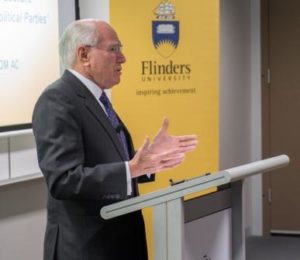 Former Prime Minister John Howard (pictured) delivered the 2013 Dean Jaensch Lecture, part of the Faculty of Social and Behavioural Science’s Professionals Lecture Series, on Tuesday evening to a capacity crowd at Flinders University Victoria Square. This is an edited extract of his speech.
Former Prime Minister John Howard (pictured) delivered the 2013 Dean Jaensch Lecture, part of the Faculty of Social and Behavioural Science’s Professionals Lecture Series, on Tuesday evening to a capacity crowd at Flinders University Victoria Square. This is an edited extract of his speech.
A Liberal enthusiast would be hard to please if he or she were unhappy with politics in Australia at present. In just six years the dismal landscape of the 25th of November 2007 has been transformed. Campbell Newman, as Lord Mayor of Brisbane, was then the most senior Liberal in the nation. He currently holds the infinitely more powerful position of Premier of Queensland but, as you all know, he shares the company of the Liberal Premiers of New South Wales, Victoria and Western Australia and the CLP Chief Minister of the Northern Territory. The most illustrious company of all, in the person of Australia’s 28th Prime Minister, joined him recently.
That is undeniably a good state of affairs for our Party but, as always with such things, immediate caveats should be entered.
If Labor supporters are feeling battered and bruised, and if any members of this audience feel sorry for them, let me remind them of some still fairly recent political history in Australia.
As Australians went to Christmas in December 1975, Australia’s oldest political party – the Australian Labor Party – must have wondered about its future. The great Whitlam dream lay in ruins. Malcolm Fraser had won the largest ever majority in the House of Representatives. Don Dunstan’s Labor Government in South Australia and Bill Neilson’s in Tasmania were the only hold-outs in a sea of blue. The Liberals had held Victoria for 20 years. Joh Bjelke-Petersen was still less than half-way through his 19 years as Premier, and the Liberals were in power in Sydney, and had regained power in Western Australia, under the leadership of the indefatigable Charles Court, after defeating a one term Labor government.
But in less than six months, Neville Wran scored an upset victory in New South Wales, commencing a 12 year reign for his party with he, himself, fashioning a new and modern model for state Labor governments, subsequently emulated around Australia. His narrow win in May 1976, followed by landslide victories in 1978 and 1981, not only revived Labor spirits but demoralised the New South Wales Liberals. The moral of this story is simple: never underestimate the recuperative powers of either of Australia’s major political parties.
A challenge, common to all political parties seeking to govern for the long term benefit of Australia, is that of sustained economic reform. There may have been a time, many years ago and prior to the modern era of Globalisation, when that was not so. But that world will never return. There is nothing static about the international economic environment. Changes which have been apparent for some time will gather pace, and they will not always work in harmony. Let me illustrate. By the year 2030, just over 16 years from now, there will be 2.2 billion more middle-class consumers in the world than there are now; 1.7 billion of them will be in Asia. By the year 2050, somewhat more distant, there will for the first time in all of recorded human history be more people over the age of 65 than under the age of 14.
These realities have great implications for Australia. The opportunities, for Australia, from an ever growing Asian middle class, are immense, and there for the taking, but only if our economy is sufficiently competitive and we, as a people, are ambitious enough to take advantage of them.
Australia’s population, like many others, is ageing. But contemplate the challenge that ageing of the population presents to China; a nation that confronts the dilemma of growing old before she has grown rich. And because of the one child policy in that country, the ageing process will be more acute, than it will be in many others.
The clear implications for Australia are that our economy needs the maximum level of flexibility and competiveness, both to benefit from the historic growth of the middle class in Asia, and handle the domestic challenges of an ageing population.
When I was PM, I frequently invoked the metaphor of the never ending footrace, to describe the need for economic reform. The finishing line keeps receding, but one dare stop running through fear that other participants in the race will surge past. The race is still on, and fresh participants keep appearing.


One of the highlights of my time working in the university sector. Mr Howard was insightful, dynamic and very generous during the ensuing question time. A real coup for Flinders. Well done to the organisers!